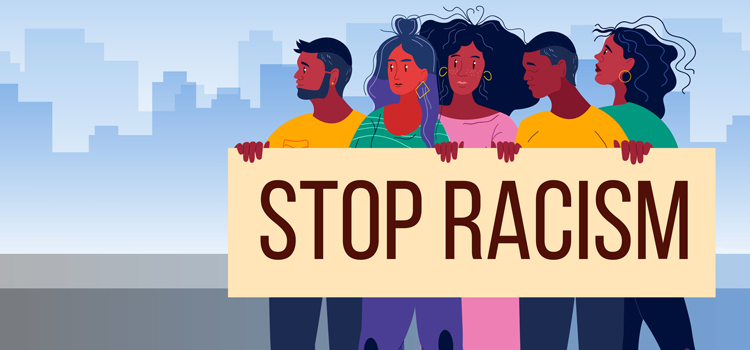DISCUSSION QUESTIONS ON RACISM

Contributors: Jo Jones, Melissa Atwater, Anthony Justice Williams, Letina Hall, Deana Taylor, Tracie Hamilton-Alston, and Dena Hawkins.
We asked our youth ministry community to come up with some discussion questions on the topic of racism, and we received a lot of responses.
Questions are a powerful tool to get students talking, and now is the time to give them an opportunity to discuss the many issues surrounding the topic.
This group of questions is only round one. We’ll publish more in the coming weeks. We’re also working behind the scenes to create a series of free youth ministry lessons on racism, with a focus on how it’s affected those in the black community.
A huge thank you to the many youth leaders who submitted these questions (see their names above), and to those who are a part of the writing process for the upcoming lessons. We appreciate you so much!
– Nick Diliberto, Ministry to Youth
Discussion Questions:
Have you seen the video of George Floyd’s death? What was your reaction to it? How did it make you feel?
How would you define racism?
How have you experienced racism towards yourself or others? How did it make you feel?
Has anyone ever assumed something about you because of the color or your skin? If so, explain.
Have you ever assumed something about someone else because of the color of their skin? If so, explain.
Has anyone ever called you the “N” word or referred to others in that way while you were present? If so, please share what happened.
Why do you think racism exists in today’s society? How do you think it will affect your future?
How has the police brutality and the protests/demonstrations impacted you on a personal level?
Do you feel your relationship with God makes you better equipped to handle all that is going within society concerning race? Why or why not?
Do you think it is important to celebrate the differences in people? Why or why not?
Is it important to have oneness in Christ or sameness in Christ? Explain. Do you think there is a difference between the two? Explain.
How do you think we can move forward and carry out racial reconciliation as a society?

12 Replies to “DISCUSSION QUESTIONS ON RACISM”
Johnine Mowatt
These are great leading questions but how to handle responses to the questions is much more important. Please encourage your facilitators to do their research before digging into the hearts and minds of the youth. Knowledge, accurate knowledge is powerful. Emotional responses while honest can be damaging.
Dr. David M. Martinez
Some of the questions are dealing with symptoms and not the real deep issues.
Lesa Simpson
These questions are well and good, but I think you need to go deeper and ask questions to connect with the teachings of Evangelical Churches since a majority of your audience is from that section of the Christian Community.
Here are some questions that challenge how we are walking in the Love of Christ at home and in our community.
Do you think Police Offices have a right to shoot a person because, “they were afraid” of an unarmed black person?
Do you think white civilians/American citizens have a right to detain, threaten, call the police, or murder Black, Brown, and Poor people for being Black and being in “their” neighborhoods?
Have you ever stood up for or or defended the rights of a Black, Brown, or Poor person when they were being mistreated or bullied?
Have you ever bullied someone because of their race, ethnicity, economic position, or sexual identity?
(You don’t have to agree with homosexuality or transgender identity in order to show them the love of Christ)
Have you been taught that you were better than other people because of the color of your skin, your blond hair, or your economic status? Have you been taught that all white people are better than Black people and God said so?
Have you ever called someone a Nigger and is that acceptable language in your home?
Does your family have a diverse group of friends and family that make up multiple racial and ethnic groups? How has that helped you to demonstrate the true love of Christ in your community?
Is your church representative of only one race of people and do you only do mission work in areas where the people represent people of color?
If Black people and other people of color visit your church, do you believe you have helped them by your presence and your God?
Do you think all Black, Brown, and Poor people need to be saved because they have no God?
Does your family believe Black, Brown, and Poor people of this country commit the majority of crimes in this country? Does this thought process affect your beliefs about Black, Brown, and Poor people?
Do you think Black, Brown, and Poor people are cursed by God and that is why they are in the situation they are in?
Have you been taught and do you believe that slavery happened a long time ago?When slavery ended Black people became equal but they were too lazy to embrace their freedoms and that is why they are all on welfare and in jail?
Do you think Black, Brown, Women, and Poor people should make less than white people in the work place when they are equally educated and qualified?
(This might be an adult question, but teenagers will be adults soon and they will be in positions of authority such as HR personnel.)
These questions may seem inflammatory. They are not. You asked for my comments, here they are. They represent my experiences since childhood. I have had these statements told to me, expressed in my presence, or been the victim of unbelievable hatred by “God’s people” numerous times. If the church is to heal we have to stop asking the oppressed to fix themselves. We have to ask the oppressor to stop believing they are God.
If you decide to remove me from you communications as a result of my questions then my suspicions are confirmed. If you want a conversation, I am available.
Jen
Spot on, Leesa.
These are meaningful, albeit, potentially uncomfortable for many. Change/ growth never happens in only comfortable situations. Paul, formerly Saul, had to be blinded before he could really “see”.
Jenn
These are awesome.
Carol
Those are very good questions and I do think that there is much more to this issue with the youth than just asking questions. Christ’s message must be included with the answers in the Christian environment.
Thank you,
Mary
For an open, thoughtful discussion on racism, I think it is important to ask open-ended questions which will encourage thought and discussion. The questions you offer for the most part seem leading and to have a yes or no answer. Of course, one can offer more but the construction of the question has a lot to do with the response to it.
Edna Rodriguez
Good questions, but I did change the “n” word to has anyone ever called you a negative name because of the color of your skin and also added in black, brown, yellow or yes, white.
zakia
Edna,
The N-word is the best word to use because the Black race is consistently called by this word by every race, nationality, countries in the world. Racism is an engraved institutional system that is controlled and run by white America who makes laws to continue racism for centuries, therefore Blacks react to racism, they don’t make the laws or control the government that makes sure Blacks are mistreated in every systematic way.
Sherry Woods
Thank You Lesa! You have provided the kinds of questions that will begin to uncover the layers of lies that so many young people have been taught to believe. These questions can pave the way for meaningful dialog that can create sustainable change in our communities, in our churches. Christ can heal the ugliness of racisim but it will require those of us working with youth to invest in this effort, not just for a minute or a conversation, but with our very lives.
Michelle Strong
Thank you for being so open and transparent with your answers.
I have a non-profit called The EYES Table which stands for ,,,
Embrace Your Elephant Scripturally
(the elephant in the room being racism)
Black & white women of faith spend 7 weeks around a table having truthful, uncomfortable but necessary conversations about racism through the lens of God’s Word.
I am starting the 5th table in May but my husband and I are headed to speak to college students of an HBCU and PWI college before 2022 ends.
Reading your comments gave me some interesting insight.
I am looking forward to this heart journey.
Michelle Strong
Thank you for being so open and transparent with your answers.
I have a non-profit called The EYES Table which stands for ,,,
Embrace Your Elephant Scripturally
(the elephant in the room being racism)
Black & white women of faith spend 7 weeks around a table having truthful, uncomfortable but necessary conversations about racism through the lens of God’s Word,
Setting the atmosphere for heart change.
I am starting the 5th table in May but my husband and I are headed to speak to college students of an HBCU and PWI college before 2022 ends.
Reading your comments gave me some interesting insight.
I am looking forward to this heart journey.